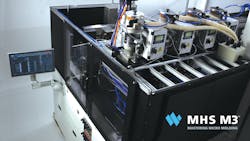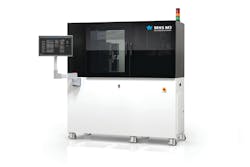Westfall Technik rolls out new 32-cavity M3 micromolding machine
By Karen Hanna
With special presses that eliminate the need for cold runners, Westfall Technik has gone big on miniaturization.
But being able to meet burgeoning demand for little parts is just one focus for the injection molding technology company, which is rolling out a new 32-cavity M3 micromolding machine over the next few months. New avenues to sustainability and innovative design are among the advantages the company is touting with the latest offering for its direct-gated mold technology.
The new development will allow molders to produce four sets of eight parts at once. According to Vijay Kudchadkar, director of advanced engineering, each quarter of the new tool can process a different color or resin — as long as the materials involved have similar processing temperatures.
“If our customer has short runs,” he said, “we can utilize the same machine to run a variety of parts. That’s one application for it. If there’s different colors, we can mold that in the same cycle.”
Kudchadkar summed up the benefits of developments involving the M3: “Less energy, less material, and you’re producing it faster, because of the cycle time [reduction] and the fact that we’re able to go up in cavitation, so your production run is done much sooner. So, there’s a lot of energy savings, material savings; there is a huge sustainability angle to our technology.”
The technology offers multiple advantages, said Merritt Williams, chief commercial officer at Westfall.
“Point being is not only what we can do from a sustainability [point of view] on the M3, but the risk reduction for the customers as it relates to quality, as it relates to control, as it relates to speed,” he said.
In addition to the 32-cavity machine, Westfall also manufactures tooling with four, eight and 16 cavities, as well as mono-cavity tooling. Tools are modular and can be swapped out, allowing for easy scalability.
The technology is available by agreement with Westfall, which employs about 2,500 people at about 20 facilities in North America, Asia and Europe, where the technology provider and processor offers customers in the packaging and medical industries everything from design through commercial production.
The systems have produced parts as small as 1.3 milligrams.
For micromolders, control — over both part quality and material consumption — is a big concern, Kudchadkar said.
“In that 32-cavity platform, we have eight injection plungers, so that gives you now eight different control points for injection pressure, which now gives you much more control over multicavity tooling. Otherwise, in a traditional multicavity tool, you only have one point of control. Now, we’ve taken, instead of one point of control, we have eight points of control, which allow you to do family tooling much easier,” he said.
He and Williams stressed the M3 machines’ elimination of cold runners, which in small parts made with exotic materials account for a lot of expense and waste. With no need to wait for runners to cool, the machines’ cycle times also are much faster than conventional micromolding machines.
“If you start making the cold runner too small, then you need very high injection pressures, and then you can’t pack that part out sufficiently, so, you have to make the cold runner big. In that case, you’re waiting 10 seconds for that cold runner to solidify, whereas the part cooled off in 2 seconds now in our technology,” Kudchadkar said.
He said the M3 machines can process all resins the company has tested, with the exception of PVC.
For molders using bioresins costing $5,000 to $10,000 a pound, the savings could be $2 million to $4 million a year, because there’s no need to throw out pricey resins as waste, Kudchadkar said.
“Once you get rid of that material consumption, you’re not consuming a whole lot of resin to make these micro parts, so the piece price comes down significantly,” he said.
This allows molders to consider resins that might otherwise be cost-prohibitive, Kudchadkar said.
“By getting rid of the cold runner, we’re also able to often make the part quality better. So, in some cases, we’ve gotten rid of sink completely from a part where the customer previously could not get rid of sink no matter what they tried on that particular part, or another example is when we molded parts with our technology for one customer in PEEK, they told us that now they’ve never seen the parts so dense, which means their strength has gone up and it performs better in the field.”
Williams, who joined Westfall after working for a contract service provider of product development and manufacturing services focused on minimally invasive medical device, said his company’s cutting-edge technology continues to inspire him.
“The one thing that drove me to come here was really it was a technology-driven company, where we knew that there was a patient and a customer on the end of what we do,” he said.
With parts getting smaller — especially within the medical industry — Westfall will continue to innovate, he said.
“Miniaturization in general is going to continue to grow,” Williams said. “People are going to continue to try to advance and push materials and technologies to the limit, where once things were machined, how do you get it to the molded part? And because they have to, they’ve got to be able to stay out in front, especially in the cost-containment environment that we’re in.”
Karen Hanna, senior staff reporter
Contact:
Westfall Technik Inc., Las Vegas, www.westfalltechnik.com, [email protected]

